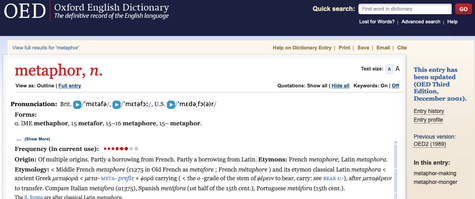Metaphors Are More Powerful Than You Might Think
In The Moves that Matter: A Chess Grandmaster on the Game of Life (slated for November release), Jonathan Rowson calls chess a meta-metaphor. He means that chess—in its constrained freedom, broad competition, and negotiated relationships—provides a library of comparisons to help us think deeply about life. But Rowson also claims that there’s a sense in which the metaphor of chess “has greater reality and resonance than the game itself” (13).
Rowson’s point deserves unpacking, which he capably does in his book, but it’s his identification of a metaphor’s practical power that matters here.

In etymological terms, metaphor breaks apart into meta-, for change, and phor, for carrying. It’s typically consigned to the literary, but it’s used powerfully (also pitiably) in public and political discourses—think of Trump’s expedient invocation of a “witch hunt” or his specious claim to “drain the swamp.”
While politicians know that well-chosen metaphors influence people’s opinions, research confirms that metaphors change behaviors, too. In the Journal of Personality and Social Psychology, researchers present a study focused on the continuation of preferred behaviors after goal completion. What, for example, helps people continue eating healthfully after completing a diet program? Or, what helps college students
keep at their study habits after they’ve aced the test? What did researchers find? The metaphor matters. Participants who considered their attainment of a goal as part of “journey” were more likely to continue the behaviors that brought about achievement. The two other participant groups—one of which considered goal attainment a “destination,” and one of which applied no metaphor at all —demonstrated no such likelihood of continuing preferred behaviors.
While metaphors will almost always add panache to your work—be it a speech, an article, or a book—it turns out that they also help us reflect on our lives and, according to recent research, live better ones.
